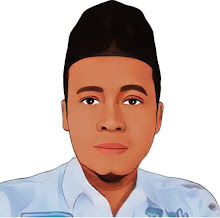BASIC VOCABULARIES ABOUT THINGS IN THE CLASSROOM
9:51 AM
10 Comments
When teaching at Elementary
school, especially the first and the second grade, the important vocabularies
they must master are things in the classroom. After learning numbers, alphabet,
usually these two grades should know the classroom vocabularies. The approach of the teaching learning process
at the elmentary school is a contextual learning. Students learn many things
around the classroom they live in. They can show and pronounce many things in
the classroom. The things are real in the classroom. The teacher can use the exact method in giving
the students new vocabularies in the classroom. He can use a song relating to
the material learning, he can play a game that encourages the students to
obtain new vocabularies, or he can use some related flashcards and so on.
 |
| The Students of SD N Siberuk are studying in the classroom |
The following words are the basic
vocabularies that Elementary students should master:
English
|
Indonesian
|
Door
|
Pintu
|
Window
|
Jendela
|
Table
|
Meja
|
Desk
|
Meja
kerja/guru
|
Chair
|
Kursi
|
Blackboard
|
Papan
tulis hitam
|
Whiteboard
|
Papan
Tulis putih
|
Chalk
|
Kapur
|
Ruler
|
Penggaris
|
Eraser
|
Penghapus
|
Floor
|
Lantai
|
Wall
|
Dinding
|
Book
|
Buku
|
dictionary
|
Kamus
|
Pencil
|
Pensil
|
pencil sharpener
|
Rautan
|
Ballpoint/Pen
|
Pena/pulpen
|
Correcting
fluid
|
Penghapus
tinta/tip-x
|
Clock
|
Jam
|
Calendar
|
kalender
|
Roof
|
Atap
|
Map
|
Peta
|
Light/lamp
|
Lampu
|
Cupboard
|
Almari
|
Picture
|
Gambar/foto
|
Bookshelf
|
Rak
buku
|
Bag
|
Tas
|
Broom
|
Sapu
|
Trash
box
|
Tempat
sampah
|
Those are the examples of the basic vocabularies we often find for elemntary school students.
Download this article here


loh kok pindah tempat "d
ReplyDeletesalam kenal, blogging mas
Slam kenal juga thanks for visiting
ReplyDeleteaslmkm mas
ReplyDeletemau tanya nie mas, pembelajaran berbasis CTI itu bagaimana ya mas.
thanks
Wlkmsalam silahkan mbk belajar lebih jelasnya di tautan ini mbk http://sarwanto.staff.fkip.uns.ac.id/files/2010/08/1_MODEL.CTL.ppt
ReplyDeleteit's cute technique, knowing some stuff around, yup - our environment just showing without telling.
ReplyDeleteseem familiar your name in englishindo comments
Haha...Thanks kang Mochtar for coming again here...Yeah I am a fan of Englishindo site, I often update visiting at the site..
ReplyDeleteI'll copy above material for my sharing partner. Coz I'm not teacher thus I don't like to call them students, too. Ha3x. As my experienced, I never call MR to bule or expatriates, but love to say PAK. Mixed Bahasa and English. Why not?! Another technique to positioned English same as Bahasa - just one tool of communication with others.
ReplyDeleteThe pleasure is mine. Sorry for not giving such a good material. I just can post such a poor article...anyway, Thanks for often coming here pals, sorry I don't know the term "pals" heheh, I just imitate you. Mr Mochtar I like your comments...
ReplyDeleteHa3x gotta lovely you say that, as my friend who has background in English also ask me about that. he3x. As suggestion, no need always say sorry for everything, as it's no need to do and unfamiliar. Coz you're a teacher (?). It's become habits? Or, I'm not polite anymore? As we think it off, by saying sorry, will get impact in feeling guilty, unconsciously. It would be influenced to students, even you don't want it happened.
ReplyDeleteWe get in trap in tenses thus un-realized that there's any different cultural sense between them.
I think I must be polite, humble.. I, myself have lots of lack, Sorry is one of my expression for being imperfect..
ReplyDelete